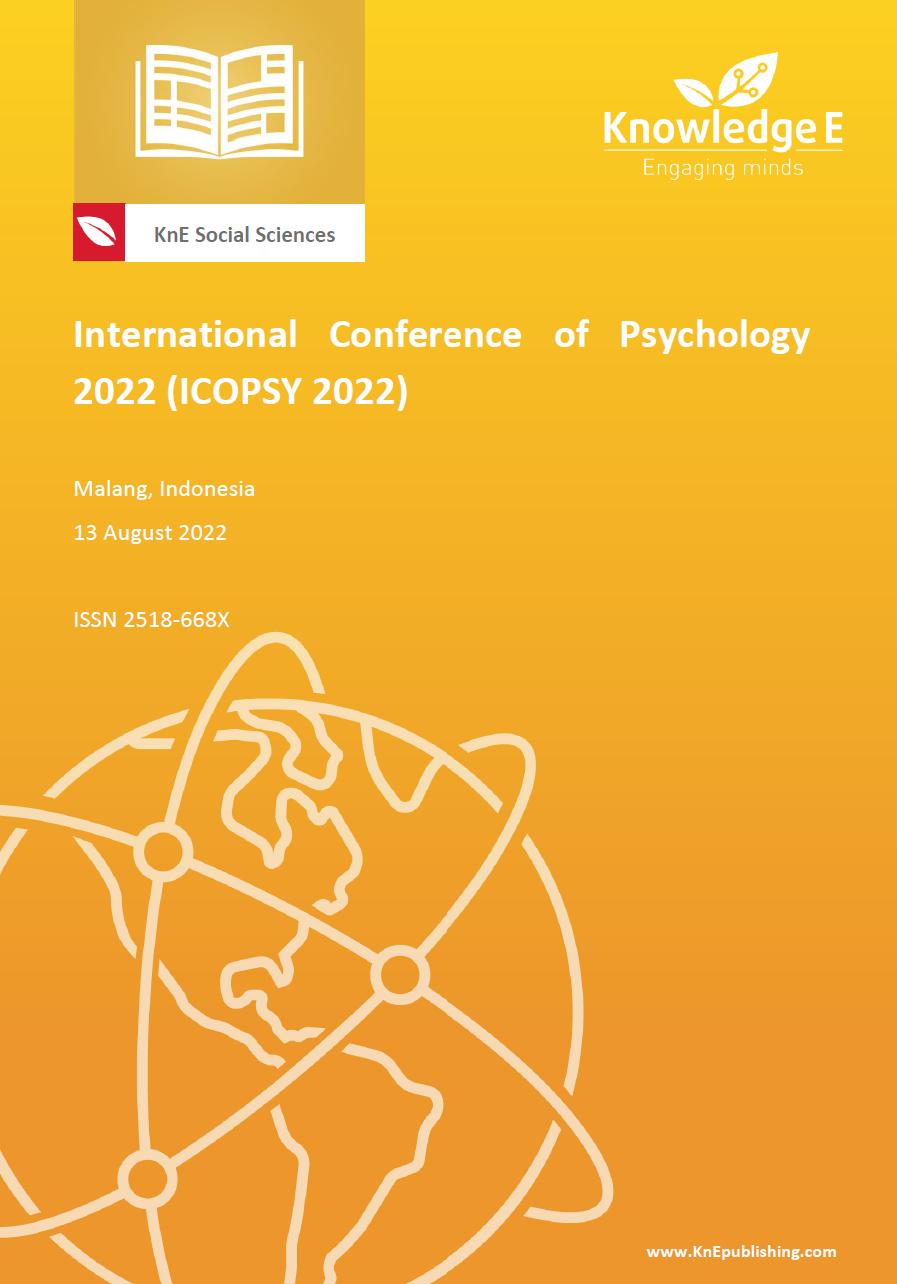The Relationship Between Self-control and Cybersex in Adolescent Students at the University of TK
DOI:
https://doi.org/10.18502/kss.v7i18.12377Abstract
For some students, the internet is a place where they can consume sexual information freely. However, if sexual information is not properly consumed, this has a negative impact. The negative behavior of consuming sexual information through the internet is called cybersex. There are several factors for the emergence of cybersex in an individual, one of which is self-control. This study aimed to examine the relationship between self-control and cybersex in a group of students at the University of TK. Using the Snowballing Sampling-Quota Sampling technique, 60 students were included as respondents in this study. The data was collected using two scales, the self-control scale and the ISST scale. The self-control scale is based on Averril’s (1973) aspects, with a Likert scale model of 30 valid items (>30) and a reliability level of .925 according to Cronbach’s Alpha. The cybersex scale employs the ISST scale, which was adapted by Minenda et al. (2015) and retested on the subject of Malang city students by Agustina (2018), with 25 valid items (>30) and a reliability level (KR-20) of .857. The study’s results using Pearson’s product moment revealed a score of .027, indicating that there is a relationship between the two variables. The correlation value is -.286, indicating that there is a negative relationship between self-control ability and cybersex.
Keywords: cybersex, self-control, adolescent, student
References
[2] Anggreiny N, Sarry SM. Kontrol sosial pada remaja yang mengakses cybersex. Jurnal RAP UNP (Riset Aktual Psikologi Universitas Negeri Padang). 2018;9(2):160- 171. https://doi.org/10.24036/rapun.v9i2.102212
[3] Purwaningsih R. Cybersex di kalangan remaja. [Unpublished graduate Thesis]. Indonesia: Universitas Muhammadiyah Surakarta; 2008.
[4] Hurlock EB. Psikologi perkembangan. Jakarta: PT Raja Grafindo Persada; 2014.
[5] Utari S, Lubis NL. Hubungan media elektronik dengan perilaku siswa tentang seks pra-nikah di SMK Muhammadiyah 2 Kota Pematangsiantar tahun 2012. Kebijakan, Promosi Kesehatan Dan Biostatistika. 2012;1(1):46–48. https://doi.org/10.4172/2161- 0525.S4-006
[6] Laier C. Cybersex addiction: craving and cognitive processes. [Unpublished dissertation]. Frankhetal: Universitas Duisburg-Essen; 2012.
[7] Monica DR, Maulani DG. Cybersexdan cyberporn sebagai delik kesusilaan. Fiat Justitia Jurnal Ilmu Hukum. 2013;7(3):337-344. https://doi.org/10.25041/fiatjustisia.v7no3.394
[8] Prawiroharjo P, Ellydar H, Pratama P, et al. Impaired recent verbal memory in pornography-addicted juvenile subjects. Neurology Research International. 2019;1-5. https://doi.org/10.1155/2019/2351638
[9] Huwaidah R, Rokhmah D, Ririanty M. Penyebab perilaku cybersex dan dampaknya pada perilaku mahasiswa (Studi kualitatif di Kabupaten Jember). Jurnal Insight Fakultas Psikologi Universitas Muhammadiyah Jember. 2020;16(2):347-362. https://doi.org/10.32528/ins.v16i2.1981
[10] Firdaus MF. Faktor-faktor yang mempengaruhi cybersex. Jakarta: Perpustakaan Universitas Gunadarma; 2020.
[11] Gufron MN, Risnawati Rini. Teori-teori psikologi. Yogyakarta: Ar-Ruzz Media; 2010.
[12] Tangney JP, Baumeister RF, Boone AL. High self-control predicts good adjustment, less pathology, better grades, and interpersonal success. Journal of Personality. 2004;72(2):271–324. https://doi.org/10.1111/j.0022-3506.2004.00263.x
[13] Hani U, Hartati R, Aiyuda N. Kontrol diri terhadap perilaku cybersex pada remaja. Psychopolytan: Jurnal Psikologi. 2020;3(2):126-132. https://doi.org/10.36341/psi.v3i2.966
[14] Andani F, Alizamar, Afdal. Relationship between self-control with cybersex behavioral tendencies and it’s implication for guidance and counseling services. Jurnal Neo Konseling. 2020;2(1):1-7. http://neo.ppj.unp.ac.id/index.php/neo
[15] Rennawati R. Hubungan antara pengendalian diri (Self Control) dan perilaku cybersex pada siswa SMA Negeri 7 Kediri. [Unpublished undergraduate Thesis]. Indonesia: Universitas Negeri Malang; 2011.
[16] Delmonico DL, Miller JA. The internet sex screening test: A comparison of sexual compulsives versus non-sexual compulsives. Sexual and Relationship Therapy. 2003;18(3):261-276. https://doi.org/10.1080/1468199031000153900
[17] Logue AW. Self control waiting until tomorrow for what you want today. New Jersey: Prentice Hall; 1995.
[18] Astuti MP. Tingkat kontrol diri remaja terhadap perilaku negatif (Studi deskriptif pada siswa kelas VIII SMP Santo Aloysius Turi Tahun Ajaran 2018/2019). [Unpublished undergraduate thesis]. Universitas Sanata Dharma Yogyakarta; 2019.
[19] Averril JR. Personal control over aversive stimuli and its relationship to stress. Psychological Bulletin. 1973;80(4):286-303.
[20] Agustina Y. Hubungan antara stres dan perilaku cybersex pada mahasiswa di kota Malang. [Unpublished undergraduate thesis]. Universitas Negeri Malang; 2018.
[21] Santrock JW. Perkembangan masa-hidup. Jakarta: Erlangga; 2011.
[22] Masroah IT, Gamelia E, Hariyadi B. Perilaku seksual remaja akibat paparan media pornografi. Kesmasindo. 2015;7(3):244-255.
[23] Sari DJE. Hubungan pendidikan seks dalam keluarga dengan perilaku seksual remaja di SMN 3 Bukittinggi Tahun 2012. Jurnal Kesehatan Masyarakat STIKes Prima Nusantara Bukittinggi. 2012;3(2):27-31. https://doi.org/10.35730/jk.v3i2.169
[24] Rahmawati DV, Hadjam NR, Afiatin T. Hubungan antara kecenderungan perilaku mengakses situs porno dan religiusitas pada remaja. Jurnal Psikologi. 2002;1,1-13. https://doi.org/10.22146/jpsi.7044

